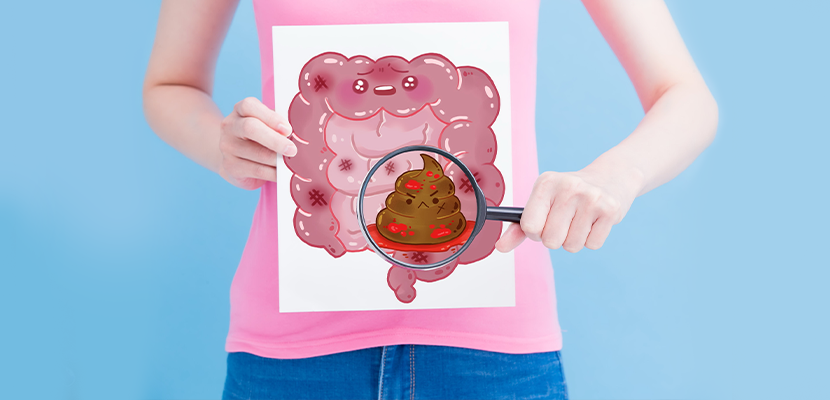Blood in stool can be a worrying sign for many people. Seeing red or dark spots in your stool might make you anxious, but it’s important to understand what it means. Blood in stool can be caused by many things, from minor issues like hemorrhoids to more serious conditions. In this article, we’ll break down everything you need to know about blood in stool, including the common causes, symptoms, when to seek help, and how to deal with it.
What is Blood in Stool?
Blood in stool simply means that there is blood present in your bowel movement. Sometimes, the blood is bright red, while other times, it might look dark or even black. The color can give clues about where the blood is coming from in your body. Bright red blood usually comes from the lower part of your digestive system, like your rectum or colon, while dark blood might be coming from higher up, such as your stomach or small intestines.
Common Causes of Blood in Stool
There are several reasons why you might see blood in your stool. Some of these causes are harmless, while others may need medical attention. Here are a few common reasons:
1. Hemorrhoids
Hemorrhoids are swollen veins in the lower part of your rectum or anus. They can cause pain, itching, and sometimes bleeding, especially after a bowel movement. The blood from hemorrhoids is usually bright red and may be seen on toilet paper or in the toilet bowl.
2. Anal Fissures
An anal fissure is a small tear in the lining of the anus. This can happen if you pass hard stools or strain during a bowel movement. Like hemorrhoids, the blood is usually bright red, and you may feel pain when passing stool.
3. Diverticulosis
Diverticulosis occurs when small pouches called diverticula form in the walls of your digestive tract. If these pouches become inflamed or infected, they can cause bleeding. The blood may be darker and mixed with your stool.
4. Gastrointestinal Infections
Some bacterial or viral infections in the digestive tract can cause inflammation, leading to blood in stool. Infections can also cause other symptoms like diarrhea, cramps, and fever.
5. Colorectal Polyps
Polyps are small growths that can form in the lining of your colon or rectum. While most polyps are harmless, some can turn cancerous over time. Bleeding from polyps may show up as blood in your stool.
6. Colon Cancer
In rare cases, blood in stool can be a sign of colon cancer. This type of cancer starts in the large intestine and can cause blood in stool, weight loss, and changes in bowel habits. Early detection is important for treatment.
Symptoms That May Accompany Blood in Stool
If you see blood in your stool, you may notice other symptoms depending on the cause. Some common symptoms include:
- Abdominal pain: This could be mild discomfort or severe cramping, depending on the condition.
- Changes in bowel habits: You might experience constipation, diarrhea, or more frequent bowel movements.
- Feeling tired or weak: Losing blood over time, even in small amounts, can lead to anemia, making you feel fatigued.
- Weight loss: If blood in stool is caused by a more serious condition like cancer, you may notice unintentional weight loss.
- Nausea or vomiting: Infections or gastrointestinal issues may cause you to feel sick or even vomit.
When to See a Doctor
Not all cases of blood in stool require medical attention, but it’s important to know when to seek help. If you experience any of the following, it’s a good idea to contact a healthcare provider:
- Blood in stool that lasts for more than a few days
- Significant pain in the abdomen or rectum
- Blood in stool accompanied by a fever
- Unexplained weight loss
- Dark, tarry stools (which could be a sign of bleeding higher up in the digestive tract)
- Dizziness or feeling faint (this could be a sign of anemia)
Diagnosis and Treatment for Blood in Stool
If you see blood in your stool, your doctor will try to find the cause by asking about your symptoms, doing a physical exam, and possibly running some tests. Here are some common methods used to diagnose the cause:
- Physical examination: Your doctor may do a rectal exam to check for hemorrhoids or fissures.
- Blood tests: A blood test can help determine if you have anemia or signs of an infection.
- Stool tests: A stool sample may be taken to check for infection, inflammation, or other signs of digestive problems.
- Colonoscopy: This procedure allows your doctor to see inside your colon and rectum to check for polyps, cancer, or other issues.
Treating Blood in Stool
The treatment for blood in stool depends on the cause. Here are some common treatment options:
- Hemorrhoids: Over-the-counter creams or ointments can help reduce swelling and pain. Eating more fiber and drinking plenty of water can also prevent constipation and make bowel movements easier.
- Anal fissures: Most anal fissures heal on their own, but you can use creams or ointments to help the healing process. Soaking in warm water can also help relieve pain.
- Infections: Bacterial infections may need antibiotics, while viral infections usually clear up on their own.
- Colon polyps or cancer: Polyps can often be removed during a colonoscopy. If cancer is found, treatment may include surgery, radiation, or chemotherapy.
How to Prevent Blood in Stool
There are several ways you can prevent blood in your stool, especially if the cause is something like hemorrhoids or constipation. Here are some tips:
- Eat a high-fiber diet: Fiber helps keep your stool soft and easy to pass, reducing the risk of constipation and straining.
- Stay hydrated: Drinking plenty of water helps prevent hard stools.
- Exercise regularly: Physical activity helps keep your digestive system moving and can prevent constipation.
- Don’t strain during bowel movements: Straining can cause hemorrhoids and fissures. Take your time and don’t rush the process.
Conclusion: Don’t Ignore Blood in Stool
While blood in stool can be a scary sight, it’s important to stay calm and understand what might be causing it. In many cases, it’s something minor like hemorrhoids or an anal fissure that can be treated easily. However, if the problem persists or if you have other symptoms, it’s always best to see a doctor for proper diagnosis and treatment.
Taking steps to prevent constipation, eating a healthy diet, and paying attention to any changes in your bowel habits can help keep your digestive system healthy and prevent future problems. If you ever have doubts, don’t hesitate to seek medical advice.













